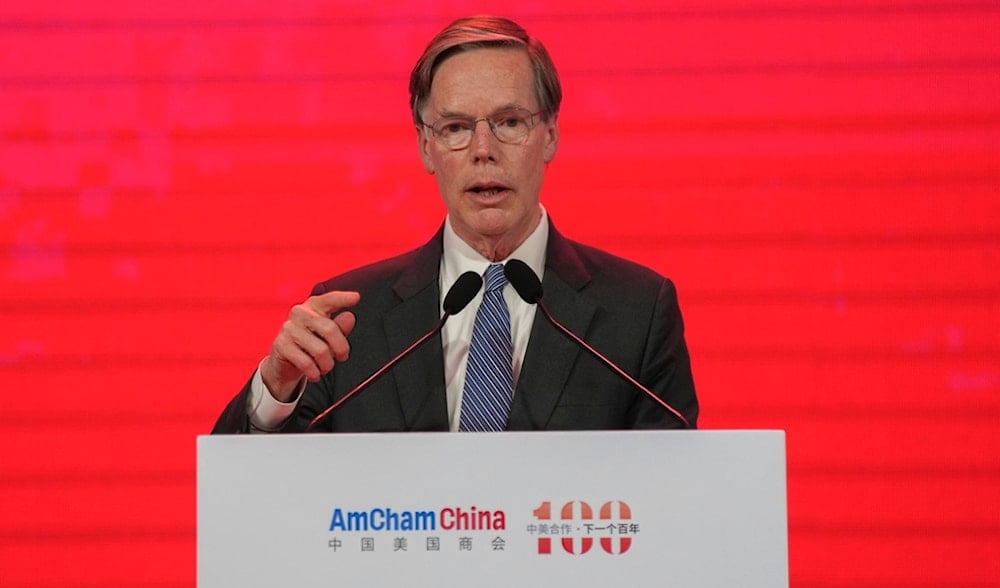US amb. to China says Beijing aligned with 'agents of disorder'
Washington's ambassador to China says the country should reposition some of its stances and trade patterns, particularly with Iran and Russia.
-

US ambassador to China Nicholas Burns speaks during an Amcham event held in Beijing, China on Friday, March 1, 2024. (AP)
The United States' Ambassador to China, R. Nicholas Burns, said the Biden administration is making one final push to halt equipment transfers from China to Russia allegedly used in the Ukraine conflict. according to The New York Times.
In an interview at the US embassy in Beijing, Burns claimed that around 400 Chinese companies have been providing Russia with "dual-use" equipment that doubles as military and commercial products. Another claim stated that China supplied Russia with 90% of the microelectronics used in the war with Ukraine.
With less than two weeks before Donald Trump takes office, the ambassador set up meetings with Chinese ministers to address concerns about Russia, as well as China's alignment with Iran and the DPRK, criticizing Beijing's policies toward these nations as inconsistent with its aspirations for global leadership in initiatives like the WTO and the Paris Agreement.
"Their actions are disruptive because they’re aligning themselves with the most unreliable agents of disorder in the international system," he said, adding that China must make a decision in this regard.
On December 17, China denied selling dual-use goods to Russia, saying it "never provides weapons to the parties to the conflict and strictly controls the export of dual-use articles, and China’s scope and measures of export control over drones are the most stringent worldwide."
Moreover, Burns urged China to leverage its oil trade with Iran to pressure Tehran to stop Yemen's Ansar Allah from attacking Red Sea shipping. It is worth noting that commercial goods not aiding the Israeli occupation are not included in Yemen's operational scope.
China, however, has seen no need to disrupt its oil flow from Iran despite sanctions imposed by the US. As long as the United Nations has not penalized Iran for its nuclear activities, China sees no reason to cease trade with the Islamic Republic, according to The New York Times.
China and the Trump-era
Burns's meetings with Chinese officials are part of a broader Biden administration diplomatic effort, following President Biden's November meeting with Xi Jinping and Jake Sullivan's August visit to Beijing.
While avoiding predictions about Trump-era policies toward China, Burns noted improved military communication and highlighted China's recent cooperation on key issues, including recovering remains of WWII-era US military personnel and cracking down on fentanyl production and exports. China has taken significant actions, such as banning 55 precursor chemicals and arresting 300 individuals involved in the fentanyl industry, according to the ambassador.
However, a November report by Bloomberg speculated that Trump's priorities appear to target Iran, China, and the Middle East in ways that contrast with the previous administration's strategies.
The appointment of Florida Senator Marco Rubio as Secretary of State signals a hardline approach, especially toward China, the report highlighted.
Rubio, a staunch critic of Beijing and sanctioned twice by Chinese authorities, aligns with Trump's plan to impose tariffs up to 60% on Chinese imports, a move expected to disrupt trade between the two largest economies.
Joining Rubio in top security roles are combat veteran Mike Waltz as National Security Advisor and Congresswoman Elise Stefanik as US Ambassador to the United Nations, both of whom share Rubio's sharp stance on China.
These appointments suggest that Trump's administration sees China as the US' foremost strategic adversary, with plans to increase economic pressure and counter Beijing's influence globally.
Read more: China calls for lifting of US tariffs in 'rational' trade talks

 4 Min Read
4 Min Read









